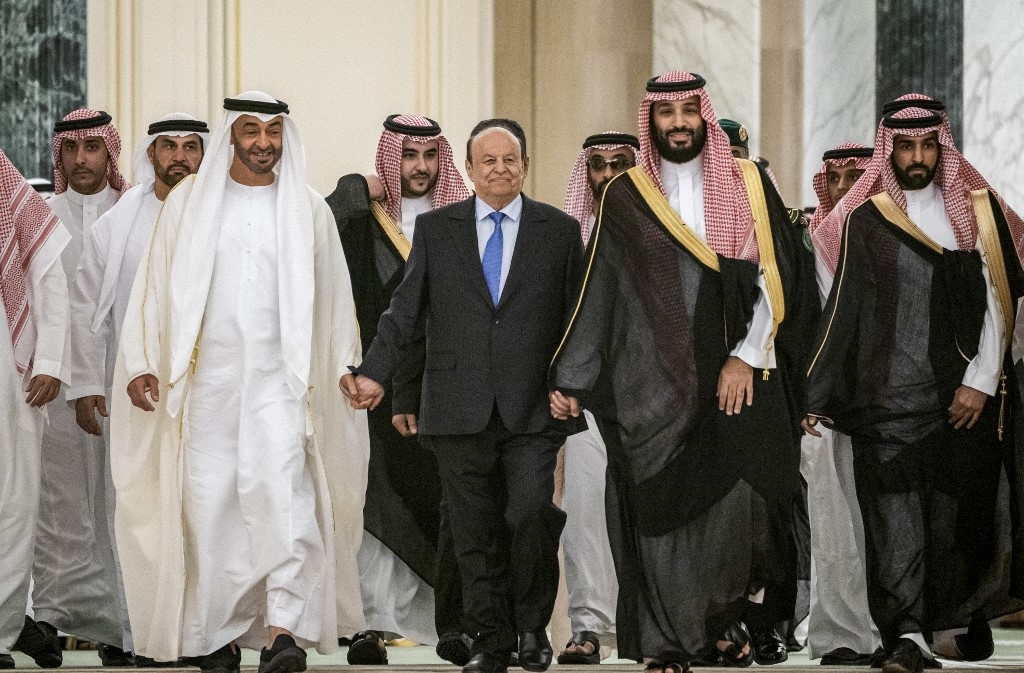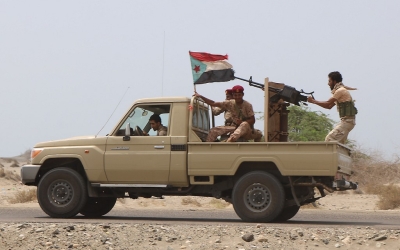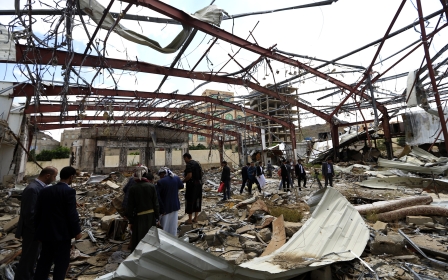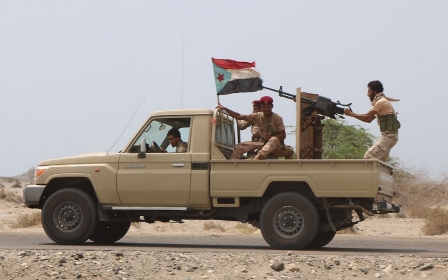Deal with south Yemen separatists leaves Hadi supporters disillusioned

When UAE-backed southern separatists rose up against the Yemeni government, Anas al-Sobaihi headed to the city of Aden along with his comrades, on behalf of President Abd Rabbuh Mansour Hadi.
Nearing the southern city entrance, the 36-year-old Fourth Brigade soldier was killed, however, in a series of Emirati air strikes.
“My son died defending Hadi's legitimacy,” Zahra, Sobaihi’s mother, told Middle East Eye.
Zahra was a supporter of Hadi and said she encouraged her son to join the conflict believing he would be defending his country against an “invasion” by UAE forces.
“Hadi said the UAE invaded Yemen, so I believed it is the duty of all Yemenis to fight the invasion,” she said.
New MEE newsletter: Jerusalem Dispatch
Sign up to get the latest insights and analysis on Israel-Palestine, alongside Turkey Unpacked and other MEE newsletters
After Sobaihi’s death, his mother said she considered him a “martyr”. She hoped his sacrifice would pay off if Aden returned to the control of Hadi’s government and if the Emiratis withdrew from Yemen's south.
So, in theory, a reconciliation deal signed in Riyadh between the Yemeni government and the separatist Southern Transitional Council (STC) should have been received warmly. However, Zahra said she was “shocked” to watch Hadi smiling next to Abu Dhabi's Crown Prince Mohamed bin Zayed and signing the agreement in his presence.
The Riyadh agreement
+ Show - HideThe Riyadh agreement, signed by the Southern Transitional Council (STC), President Abd Rabbuh Mansour Hadi's government, and their Saudi and Emirati backers, was announced on 5 November by Saudi Crown Prince Mohamed bin Salman.
According to the deal, the STC will be part of a new cabinet and tens of thousands of UAE-backed southern forces will be placed under Yemeni government control.
The deal stipulates that within 30 days, the two sides should form a new government of no more than 24 ministers, with 50 percent STC and southern representation.
Hadi would maintain control on key ministries, including interior and defence, while the STC would get two portfolios.
The STC will also be included in political negotiations to end the war against the Houthi movement.
All military forces, the deal stipulates, shall be placed under the defence ministry, while security forces would be under the control of the interior ministry.
Within 15 days, all forces deployed in the south since August should return to their previous positions, and medium and heavy weapons are to be handed over under coalition supervision.
Within 30 days, government and STC military forces should leave Aden and Saudi Arabia’s military is to oversee security in the city.
“I did not believe my eyes when I watched Hadi on TV smiling to bin Zayed,” she told MEE.
“The UAE killed my son, so I was thinking that Hadi would seek to prosecute the UAE internationally for its aggression.”
“Moreover, the agreement did not mention the deaths in any of its articles, and we have become the enemies of our brothers in the south [STC] while Hadi has turned into the hero of peace,” she added.
According to Zahra, her son’s family has not received any salary since August, and they are afraid to request money from authorities in Aden because he was killed fighting them.
“Hadi is a traitor. He sold our sons’ blood to the UAE. I advise all supporters of Hadi not to support him anymore because he is willing to sell them anytime,” Zahra said.
“I also apologise to our brothers in the STC in Aden, and I hope they can pay salaries of all soldiers, even those who were killed while they were fighting with Hadi.”
The Riyadh agreement 'neglected victims'
A number of activists and journalists have criticised what they perceive as the Riyadh agreement’s neglect for the dozens of victims and their families.
Anes Mansour, a consulting journalist for the Yemeni embassy in Riyadh and chairman of the Aden Centre for Studies, said he opposed the agreement because it overlooked the Emirati role in the killing of Yemenis.
“They are talking about preventing bloodshed, but have forgotten who killed an army and chased the wounded to hospitals to kill them, and those who died because of [UAE] air strikes,” he said in a tweet.
“We are against the agreement and we are sure it will fail and collapse, and the coming days will prove this.”
In another tweet, Mansour said he is not against peace, but that he opposed “dependence and surrender”.
“We need peace that preserves our homeland, dignity, independence and sovereignty away from racism and regionalism,” he said.
Ahmed Alshalfi, the editor of Yemen news at Al Jazeera TV, also tweeted his opposition to the agreement.
“Any agreement between two conflicting parties has an annex that guarantees the rights of victims and their families, except the Riyadh agreement, which Hadi and the Saudis signed,” he said, accusing them of failing to hold the UAE accountable for its actions against the Hadi government.
He added that the agreement has provided the UAE a chance to participate in Yemen's government “without accountability”, despite its perceived role in killing the pro-Hadi Yemenis.
Ministers 'cannot return home'
During battles between pro-Hadi forces and the STC in Aden, some ministers like Interior Minister Ahmed al-Maisari and Transport Minister Saleh al-Gabwani struggled until the end and kept supporting Hadi.
Those ministers, along with other military leaders originally from the south, fiercely defended Hadi's right to govern the south, but are not permitted to return to Aden by the Riyadh agreement, with only the prime minister allowed back.
“I believe that Hadi did not have any other choice,” Mohammed Abdu, a pro-Hadi resident in Taiz told MEE.
“By signing the agreement, he was forced to disappoint his supporters, including ministers and fighters,” he added, explaining that the agreement will cost Hadi many of his supporters.
For Abdu, the main positive point in the agreement is that Hadi can return to Aden and form a government, and then he can lead the battles against the Houthis from the city. Aden had been the Yemeni government's seat since it was expelled from Sanaa by the Houthis in 2014.
“I hope there will not be more chaos in Aden and that all sides will work shoulder to shoulder under the leadership of Hadi to liberate Yemen from the Houthis,” he said.
Gabwani, the transport minister, tweeted on Wednesday that the agreement “gave the pro-Hadi coalition full legitimacy for the management of the country”.
“The future of the [coalition] will depend on the men it will choose to manage the coming period,” he said.
STC media official Mansour Saleh told Al-Arabiya TV on Tuesday that no minister would be allowed to return to Aden, but those who are originally from the south “can return as citizens”.
Troops loyal to the coalition, not Hadi
With the unpopular Riyadh agreement inked, question marks remain over the level of loyalty Hadi commands among the troops fighting on behalf of his government.
Particularly in focus is the Guards of the Republic, a military unit under the leadership of Tareq Saleh, nephew of late President Ali Abdullah Saleh. The militia was established in Aden and the western coast after the death of Saleh in 2017.
The Guards of the Republic is one of several military groups that did not participate in the battles against Hadi in Aden and whose brigades are fighting the Houthis on the frontlines. Their fighters do not receive directions from Hadi, but rather from the Saudi-led coalition fighting the Houthis.
'Hadi is a traitor. He sold our sons’ blood to the UAE'
- Mother of a Yemeni soldier killed in Aden battles
Mubarak, a fighter in the western coast in Tareq Saleh’s forces, told MEE: “All fighters on the western coast and in the south are loyal to the Saudi-led coalition. No one loyal to Hadi is fighting the Houthis in the south and on the western coast because they believe that Hadi cannot defend the rights of his fighters.”
Mubarak said many pro-Hadi brigades have had mass desertions, and fighters loyal to the president are only deployed nowadays in Shabwah and a few areas in Abyan in Yemen's southeast.
“Even after the Riyadh agreement most of them will not dare return Aden as Hadi may disappoint them again,” Mubarak said.
“I can say that most of the military units in the south receive directions from the Saudi-led coalition, and we are happy to work under its leadership until we liberate the whole country from the Houthis.”
Middle East Eye delivers independent and unrivalled coverage and analysis of the Middle East, North Africa and beyond. To learn more about republishing this content and the associated fees, please fill out this form. More about MEE can be found here.





